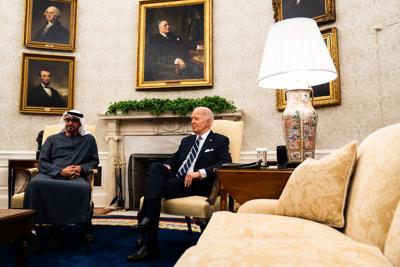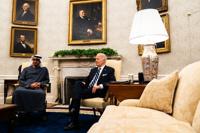Amid a flurry of dealmaking and fanfare on President Donald Trump’s Middle East trip this week, one theme was clear: The Persian Gulf states have cemented their role as key players in the artificial intelligence boom.
For all the talk of preventing China’s authoritarian government from dominating the AI industry, the deals put a different set of authoritarian countries squarely at the forefront of AI. The emirs and sheikhs of the gulf will be accessing, building and, most importantly, funding the technology in the coming years, side by side with U.S. companies.
The trend was well underway before Trump’s trip, but the president, hopping around the region with a coterie of tech billionaires, has accelerated and highlighted the shift.
Intense negotiations
On Thursday, OpenAI was in intense negotiations with two national champions in the United Arab Emirates, G42 and MGX, over a megadeal that would enable the San Francisco-based company to build data centers and develop its technology in the country, said three people familiar with the discussions who spoke on the condition of anonymity to describe nonpublic developments. In turn, OpenAI would receive new investments that would enable it to build U.S. data centers with a consortium of partners.
OpenAI declined to comment. The Washington Post has a content partnership with OpenAI.
AI chip developer Nvidia is set to sell hundreds of thousands of its most advanced chips to the UAE, The Post reported this week. Those sales would have been severely limited under rules former president Joe Biden had put in place, which the Trump administration scrapped last week just days before they were meant to go into effect.
Those UAE deals would come on top of billions of dollars’ worth of agreements with Saudi Arabia and Qatar that were showcased in recent days, involving semiconductor chip sales, mining for rare minerals and data centers with major U.S. firms. Some of the deals appeared to predate Trump’s second term, and to include rough estimates for how much contracts could generate in the future.
The White House on Thursday took credit for an additional $200 billion in commercial deals between U.S. and UAE firms. It said it had reached new agreements for the UAE to invest in “U.S. data centers that are at least as large and as powerful as those in the UAE,” and to commit to stronger protections against the diversion of U.S. technology.
Human rights violations
A who’s who of the tech industry, including Nvidia CEO Jensen Huang, Elon Musk, OpenAI CEO Sam Altman and Amazon CEO Andy Jassy, joined Trump in Saudi Arabia this week. (Amazon founder Jeff Bezos owns The Washington Post.) It’s a shift from just a few years ago, when top tech executives did not attend the kingdom’s flagship tech expo as activists criticized the regime for human rights violations and the killing of Post columnist Jamal Khashoggi.
In a speech in Riyadh, the Saudi capital, on Tuesday, Trump said new gulf leaders are “forging a future where the Middle East is defined by commerce, not chaos; where it exports technology, not terrorism.”
But the reality is far more complicated. Some foreign policy experts have expressed concerns that the United States is offshoring a core strategic technology, selling it to the highest bidder and potentially undermining U.S. dominance.
“Deals on the scale being contemplated could be enough for the UAE to build some of the world’s biggest supercomputers,” said Sam Winter-Levy, a fellow at the Carnegie Endowment for International Peace who focuses on AI tech. The trip “marks the emergence of the gulf as one of the biggest players in the AI race. I hope the Trump administration thought about whether this is an outcome they wanted to encourage, and I hope they got real concessions - and not illusory promises of security - in return.”
In the run-up to the Trump trip, the White House had discussions with UAE officials about building guardrails to prevent the technology from getting diverted to China or other U.S. adversaries, according to an administration official involved in the talks who spoke on the condition of anonymity to detail private discussions. UAE officials agreed to keep the computing power in the country and only allow remote access to approved customers, and to set up audit trails.
AI powerhouse
The Trump administration’s view, the person said, is that the region aspires to be an AI powerhouse and that if the U.S. does not find a path for the countries to access American technology, Chinese hardware will become dominant there.
G42 received 100,000 graphic processing units, or GPUs, and another 400,000 will go to U.S. companies operating in the region, the person said. The United States, by contrast, has millions of GPUs, and the investment from the UAE in U.S. data center infrastructure will enable American companies to advance at a far greater pace. The person added that in this arrangement there was little risk of the Middle East surpassing the U.S. in AI.
U.S. tech leaders, including OpenAI’s Altman, have spent the past several years angling for financing and partnership in the region. They’ve had to look well beyond Silicon Valley to raise cash because of the costly and energy-intensive nature of producing AI. Companies such as Amazon, Microsoft, Anthropic, Musk’s xAI and others have plans to scale up the computing power in their data centers, buying hundreds of thousands of chips.
Artificial intelligence is considered a core strategic technology for national security, particularly because of its use in a new generation of autonomous weaponry or practices such as nuclear modeling. For that reason, U.S. tech leaders have sought the imprimatur of the government before engaging in dealmaking in the Middle East.
The Biden administration, keenly aware that deepening ties between China and the Middle East threatened U.S. tech dominance, encouraged Silicon Valley firms to cut deals in the region, in particular with the UAE. But its officials eyed Saudi Arabia and Qatar, both countries with spotty track records on human rights issues, more cautiously.
The Biden administration had proposed allowing chip sales there, but on a staged timeline, with certain caps and guardrails. For example, local companies that met stringent security standards would be able to purchase chips that were estimated to be about 12 months behind the most advanced models, enabling the U.S. to maintain an edge. And trusted U.S. companies could have installed up to 7% of their computing base in each gulf country.
Restrictions on technology
The restrictions were put in place to maintain U.S. dominance and to prevent some of the technology from being reexported to China, as well as to protect against AI being used for surveillance of populations, cracking down on dissidents or other undemocratic purposes.
The tenor of the events in the Middle East this week, and the flood of announcements and the lifting of caps, demonstrates that the vibe has shifted, from a more hesitant integration with gulf countries to a full-throated embrace of their role as financiers and partners in the AI revolution.
This week’s dealmaking in the gulf, blessed by the Trump administration, was the strongest demonstration yet of an argument that the American AI industry has embraced with heightened urgency in recent months: that a no-holds-barred approach to regulation is the only possible course to stop China from becoming the world’s dominant AI power.
In public statements and congressional testimony, AI executives have framed their mission to develop supersmart artificial intelligence as existential for democracy. If American politicians regulate the tech too strictly, the AI industry has argued, China’s authoritarian government may dominate the tech, boosting its geopolitical power.
Altman in particular has repeated the need for “democratic AI,” including by writing in an opinion piece in The Post in 2024 that “a democratic vision for artificial intelligence must prevail over an authoritarian one.”


